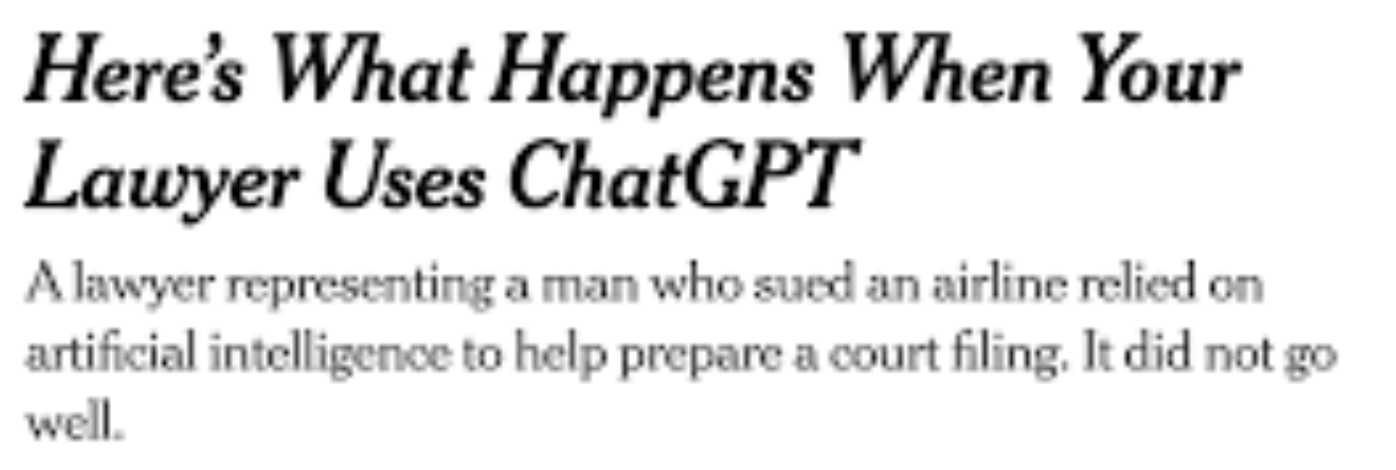In the landmark case of Ko v. Li 2025 ONSC 2766, Justice Fred Myers of the Ontario Superior Court of Justice issued a scathing rebuke against a lawyer for submitting a factum of law purportedly prepared with the assistance of ChatGPT. This marks the first Ontario case where a judge intends to penalize a lawyer for doing so.
Justice Myers’ findings reveal a troubling scenario where the lawyer’s factum contained case citations to non-existent legal cases and misrepresentations of the rulings in existing cases, some of which contradicted her arguments in court.
When questioned about the sources cited, the lawyer could not explain why this occurred. Justice Myers wrote:
“I asked Ms. Lee if her factum was prepared by artificial intelligence – like ChatGPT. She told me that her office does not usually do so but that she would have to check with her clerk. Ms. Lee was unable to provide me with citations to the cases cited in her factum or to provide me with copies of the cases from the printed papers she was using to make her submissions.”
The judge emphasized several key points in his decision that serves as a pounding alarm bell to the bar:
1. Duty to the Court: Lawyers have a fundamental duty to represent the law faithfully to the court. This includes accurate citation of legal precedents and avoidance of misleading submissions.
2. Competence in Technology Use: While leveraging AI for legal research and document preparation is permissible, lawyers must ensure competent supervision and review of materials prepared by AI systems. This duty extends to verifying the accuracy and relevance of AI-generated content.
3. Misrepresentation Risks: Submitting fabricated or inaccurately cited legal authorities constitutes an abuse of process and can lead to miscarriages of justice.
4. Responsibility for Errors: Unlike a case where errors were caught before the hearing and corrected, this lawyer persisted with unsupported citations during oral submissions, failing to rectify the misleading information afterward.
5. Emerging Challenges with AI: The rapid integration of AI in legal practice necessitates a clear stance from the courts on the responsibilities and risks involved. Lawyers cannot rely on non-existent legal authorities or misinterpreted precedents.
This case underscores the evolving landscape of legal practice with the advent of AI technologies. While AI offers efficiencies and capabilities in legal research, its use must be tempered with rigorous oversight and verification processes to uphold the integrity of the legal profession and the administration of justice.
This case is still unfolding. Justice Myers intends to rule on the professional misconduct of this lawyer at a hearing where she may show cause why she should not be held in contempt, writing:
“I order Ms. [lawyer] to show cause why she should not be cited for contempt. Despite the traditional wording of this notice, Ms. [lawyer] is protected by the presumption of innocence and other procedural rights as discussed by the Court of Appeal in Cohn. She will have a fair opportunity to submit evidence to explain what happened if she wishes to do so.”
This decision serves as a stark reminder of the ethical and professional obligations lawyers must uphold in an increasingly digitized legal environment where the ease of using ChatGPT must be balanced against the potential for professional misconduct.
CASE LINK: https://www.canlii.org/en/on/onsc/doc/2025/2025onsc2766/2025onsc2766.html
Steve Benmor, B.Sc., LL.B., LL.M. (Family Law), C.S., Cert.F.Med., C.Arb., FDRP PC, is the founder and principal lawyer of Benmor Family Law Group, a boutique matrimonial law firm in downtown Toronto. He is a Certified Specialist in Family Law, a Certified Specialist in Parenting Coordination and was admitted as a Fellow to the prestigious International Academy of Family Lawyers. Steve is regularly retained as a Divorce Mediator/Arbitrator and Parenting Coordinator. Steve uses his 30 years of in-depth knowledge of family law, court-room experience and expert problem-solving skills in Divorce Mediation/Arbitration to help spouses reach fair, fast and cooperative divorce settlements without the financial losses, emotional costs and lengthy delays from divorce court.
Editorial note: This article was first published in May, 2025. It is republished here for reference.
Share this article on:
